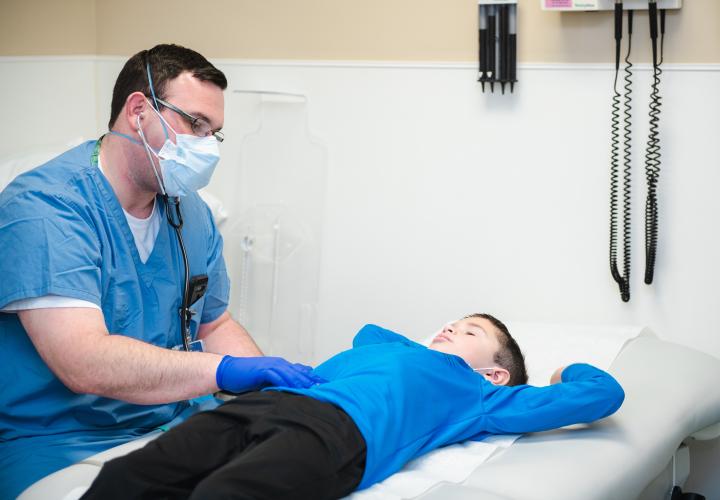Why choose us?
The Disorders of the Gut-Brain Interaction (DGBI) Clinic in the Center for Neurogastroenterology and Motility Disorders provides a thorough and comprehensive approach to caring for your child. Your child will be evaluated by Connecticut Children’s pediatric gastroenterologists, who specialize in the diagnosis, management and treatment of gastrointestinal (GI) disorders and their interactions with the brain. Depending on your child’s symptoms, you and your child may also have the opportunity to meet with our GI psychologist.
What are DGBIs?
Disorders of the gut-brain interaction, previously known as functional gastrointestinal disorders, involve changes in the sensation and movement of the gastrointestinal tract. DGBIs are diagnosed using a patient’s symptoms, since lab results, endoscopic findings and imaging are often normal in these conditions.
Doctors don’t know exactly what causes DGBIs. They seem to be the result of a complex dysfunction in the communication between the nervous system within the wall of the gastrointestinal tract (enteric nervous system) and the brain and spinal cord (central nervous system). This disruption in communication is thought to be caused by many different contributing factors, including genetic, environmental and psychiatric.
Who may benefit from being seen at our interdisciplinary clinic?
DGBIs are some of the most common reasons why youth are referred to a pediatric gastroenterologist. Connecticut Children’s gastroenterologists specialize in treating these conditions, and offer the most up-to-date, evidence-based interventions.
We use an interdisciplinary approach to find answers to complex health questions. At our integrated DGBI Clinic, your family will have the opportunity to meet Connecticut Children’s specialists from neurogastroenterology and motility, psychogastroenterology, and nutrition in one visit.
Here are some reasons that patients are referred to our Pediatric DGBI clinic:
- Functional abdominal pain
- Functional constipation
- Irritable bowel syndrome
- Functional nausea
- Functional dyspepsia
- Rumination syndrome
- Cyclic vomiting syndrome (CVS)
- Abdominal migraine
Functional Abdominal Pain
Functional abdominal pain is one of the most common DGBIs, accounting for more than one out of 10 DGBI diagnoses. Similar to other DGBIs, the underlying cause is complex. Functional abdominal pain occurs when a patient has abdominal pain that happens all the time, or on occasion at least four times per month for at least the last two months. The pain is not associated with eating or menses, and cannot be fully explained by another medical condition.
This diagnosis can be difficult to treat. However, Connecticut Children’s gastroenterologists specialize in functional abdominal pain, and provide the most effective and up-to-date management and evaluation.
Specialized Care
Our specialized pediatric psychologist will work with your family and your medical provider to develop evidence-based psychosocial interventions to help improve your child’s overall quality of life.
If your gastroenterologist suggests that your child’s treatment plan include a consultation with our integrated DGBI Clinic, it does not mean that they believe your child’s symptoms are “all in their head.” We know that what your child is feeling is very real and can be impairing.
Connecticut Children’s takes a biological, psychological, and social approach to treating these conditions—because that’s what works best. The gut and the brain are very highly connected, and research shows that these techniques are becoming first-line treatments for improving GI symptoms.
